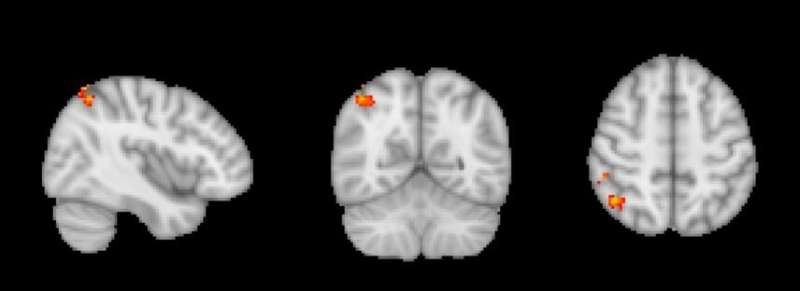
[ad_1]

Illustration: fMRI brain scans, showing the increase in brain activity in the right angular gyrus in the prucalopride group compared to the placebo group. Credit: Angharad De Cates. This illustration is licensed under the Creative Commons Attribution 4.0 International License.
The development of drugs to treat cognitive problems in patients with mental illness could be one more step after a team of researchers found that an existing drug, used to treat constipation, may be able to improve our ability to think more clearly.
Serious psychiatric disorders can have a devastating impact on a patient’s life. Cognitive impairment, including reduced attention and working memory, as well as impaired social cognition and language, are prevalent in psychiatric disorders such as major depression, schizophrenia, and bipolar disorder. These common problems are poorly treated with current medications and often have a big impact on people’s lives. Scientists are therefore looking for ways to improve or restore these functions.
Previous animal studies have shown that drugs targeting 5-HT4 Serotonin receptors show promise for improving cognitive function (serotonin is the neurotransmitter targeted by SSRI antidepressants). However, it has been difficult to translate these animal findings into human studies due to concerns about side effects. Now a group of British researchers have tested an existing approved drug, prucalopride, which targets 5-HT4 receptor, and found that it can improve cognition. Prucalopride is prescribed primarily for constipation and has an acceptable level of side effects if taken under medical supervision.
Forty-four healthy volunteers aged 18 to 36 participated in the trial. Twenty-three received prucalopride and 21 received placebo. After six days, all volunteers underwent brain fMRI. Before entering the MRI scanner, volunteers were shown a series of images of animals and landscapes. They saw them and similar images again during the analysis. After the scan, the volunteers performed a memory test: they were asked to distinguish the images they had seen before and during the scan from a set of completely new images.
Presenting the work at the European College of Neuropsychopharmacology conference in Lisbon (with simultaneous publication, see below), Principal Investigator Dr Angharad de Cates of the University of Oxford said: “The participants who had taken prucalopride for six days performed much better than those who received placebo on the memory test; the prucalopride group identified 81% of previously viewed images versus 76% in the placebo group. Statistical tests indicate that this was a fairly large effect – such obvious cognitive improvement with the drug surprised us. “
The researchers found that, compared to those taking the placebo, the volunteers taking prucalopride were both significantly better on the memory test after the scan, and also had fMRIs indicating increased activity in areas of the brain related to cognition. The increased activity was in areas associated with memory, such as the hippocampus (in the center of the brain) and the right angular gyrus (towards the back of the brain).
Dr Susannah Murphy, senior researcher at the University of Oxford and lead author of the study, said: “Even when the bad mood associated with depression is well treated with conventional antidepressants, many patients continue to experience memory problems. The study provides exciting early evidence in humans of a new approach that may be a useful way to address these residual cognitive symptoms. “
Angharad de Cates said: “This is a proof-of-concept study, and therefore a starting point for further investigation. We are currently planning and undertaking further studies with prucalopride and other 5HTs.4 agonists in patients and clinically vulnerable populations, to see if our findings in healthy volunteers can be replicated and have clinical significance. ”
Prucalopride is a 5-HT4 agonist taken primarily for constipation. It does not have significant side effects if taken under medical supervision, although doctors warn of the possibility of headaches, gastrointestinal symptoms such as abdominal pain, nausea and diarrhea, and fatigue. or dizziness; there were no significant side effects shown by any of the volunteers taking prucalopride in this study.
Dr Vibe Frokjaer, Assistant Professor in the Department of Psychology at the University of Copenhagen, said: “This study highlights a very interesting and much needed potential for the reuse of drugs to help cognitive dysfunction, which is often associated with psychiatric disorders, even in relapsing-remitting states. , as the authors also state, translating these findings from healthy populations into clinical populations will be critical. It will also be important to understand whether prucalopride adds to the effects of existing antidepressant treatments, or can be used as stand-alone therapy. “
To coincide with the presentation of the ECNP, the work is published today in the peer-reviewed journal Translational Psychiatry.
New idea for Alzheimer’s disease treatment targets tau
Already seen? Neuronal and behavioral effects of the 5-HT4 receptor agonist, prucalopride, in a hippocampal dependent memory task, Translational Psychiatry (2021). DOI: 10.1038 / s41398-021-01568-4
Provided by the European College of Neuropsychopharmacology
Quote: Intestinal drug that stimulates memory and cognition (2021, October 4) retrieved October 4, 2021 from https://medicalxpress.com/news/2021-10-intestinal-drug-shown-boost-memory.html
This document is subject to copyright. Other than fair use for private study or research purposes, no part may be reproduced without written permission. The content is provided for information only.
[ad_2]
Source link